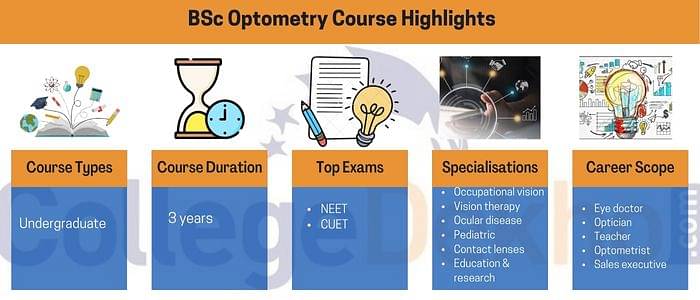BSc Optometry
About BSc Optometry Course
BSc Optometry is a field of study which deals with the study of the human eye. In BSc Optometry course, one studies the eyes and all the other information such as structure, abnormalities, etc subjects related to the human eye. Along with studying about the eye, the candidate also learns about how to use various kinds of tools and equipment related to the eye treatment. BSc Optometry is an undergraduate course offered by various reputed colleges in India. The course duration is three years. Along with the three year degree program, candidates also need to do a one year internship program as well. Hence, the total duration of the BSc Optometry course is four year. The internship is a compulsory program without which a BSc degree in Optometry would not be complete. A detailed insight into the BSc Optometry Syllabus must be looked at for a better understanding of the subject matter.
Candidates who pursue this course and make a career in this field are known as Optometrists. The main work of an optometrist is to deal with various tools and equipment related to the human eye. According to the World Council of Optometry, World Health Organization and about 75 optometry organizations, optometry and optometrist are defined as follows: “Optometry is a healthcare profession that is autonomous, educated, and regulated (licensed/registered), and optometrists are the primary healthcare practitioners of the eye and visual system who provide comprehensive eye and vision care, which includes refraction and dispensing, detection/diagnosis and management of disease in the eye, and the rehabilitation of conditions of the visual system”.
Bachelor of Science BSc Optometry Latest Update
As per the official notification, the CUET Application Form 2024 was scheduled to be released on February 26, 2024. Candidates must visit the official website for more information related to the registration process.
The WBJEE has released the official JENPAS UG 2024 Exam date as June 30, 2024. The registration process for the same is expected to commence shortly.
According to the official notification by the NTA, NEET Application Form 2024 is available to be downloaded at the official website. The last date for NEET UG 2024 registration is March 9, 2024.
Table of Contents
- About BSc Optometry Course
- Bachelor of Science BSc Optometry Latest Update
- BSc Optometry Course Highlights
- Why Choose BSc Optometry?
- BSc Optometry Vs B.Optometry
- Types of BSc Optometry
- BSc Optometry Eligibility Criteria
- BSc Optometry Course Entrance Exams
- BSc Optometry: Entrance Exam Preparation
- BSc Optometry Admission Process
- Documents Required for BSc Optometry
- BSc Optometry Course Syllabus
- Top BSc Optometry Colleges
- BSc Optometry Course Books
- BSc Optometry Career Options and Job Prospects
- Scope After BSc Optometry
- Higher Education after BSc Optometry Course
- FAQs about BOPTM
BSc Optometry Course Highlights

BSc Optometry is a total four year undergraduate course. The course duration is a three year and one year compulsory internship program after the completion of the three year degree program. Any candidate who has completed class 12th degree from any recognized board is eligible for taking admission in BSc Optometry course. BSc optometry course admission is based on the entrance examination basis. There are various BSc Optometry colleges in India which provide the best training and internship in this particular course. Below are some of the important highlights related to the BSc Optometry course.
| Name of the Course | BSc Optometry |
|---|---|
| Full Form of the Course | Bachelor of Science in Optometry |
| Level of the Course | Undergraduate |
| Specialization provided by the Course |
|
| BSc Optometry Total Course Duration | 3 Year Undergraduate Program along with 1 year compulsory Internship Program |
| Eligibility for BSc Optometry Course | Must have done Class 12th from a recognized board of education in India |
| Admission Process for BSc Optometry Course | Entrance Exam is conducted; Some colleges also conduct an interview round |
| BSc Optometry Course Fees | INR 10,000 to 1 LPA |
| Jobs offered to Candidates with BSc in Optometry |
|
| Top recruiting areas for BSc Optometry |
|
| BSc Optometry Salary in India | INR 3 LPA to INR 9 LPA |
Why Choose BSc Optometry?
Here are the primary reasons why candidates should opt for BSc Optometry Course.
- Students post-graduation become well-adept professionals, all thanks to hands-on training. Graduates are able to indulge in optometric practices, grasp pediatric optometry, study aspects of clinical optometry contact lenses, and learn more about how to treat binocular vision eye diseases.
- BSc Optometry course degree serves as the groundwork for further higher studies in this field like M.Sc., M.Phil, or Ph.D.
- Candidates get to explore a dynamic and challenging career where they can achieve personal growth and receive appreciation from society.
- One can also join the research community and assist in making a true impact around the field.
BSc Optometry Vs B.Optometry
BSc Optometry and B.Optometry are the two most popular degree programs in the field of Optometry. While the Bachelor of Optometry is more inclined towards being a professional course, the BSc optometry course is much more focused on the theoretical aspect. Here are some other major differences between BSc optometry and B.Optometry.
| Parameters | B. Optometry | BSc Optometry |
|---|---|---|
| Full Form | Bachelor of Optometry | Bachelor of Science in Optometry |
| Eligibility | 10+2 in PCMB with a 50% minimum aggregate. | 10+2 in PCBM completed from a renowned board of education |
| Duration | 4 years | 3 years |
| Level of Study | Undergraduate | Undergraduate |
| Average Course Fees | INR 15,000 - 1.5 LPA | INR 10,000 - 1 LPA |
| Admission Process | Direct admission | Entrance exam followed by a counselling |
| Job options | Optometrist, orthoptist, low vision specialist, optician, etc. | Eye Doctor, Optometrist, Sales Executive, Optician, Teacher, etc. |
| Average Starting Salary | INR 9 LPA | INR 2.5 LPA - INR 8 LPA |
Types of BSc Optometry
BSc Optometry course is primarily categorized into two types in India: full-time course and distance course. Therefore, mentioned below is the list of BSc Optometry course details:
| Types | BSc Optometry Eligibility | BSc Optometry Course Duration |
|---|---|---|
| Full-Time |
| 3 Years |
| Distance Education |
| 3-5 Years |
Distance BSc Optometry Course Details
The UGC-DEB recognized distance learning BSc in Optometry program aids students in studying the subject in a flexible setup. A few crucial things to remember while keeping the distance learning BSc Optometry course in mind, are listed below:
- The distance BSc in Optometry course is taught across certain colleges, such as IMTS Institute, Neptune Institute of Management and Technology, Global Open University Nagaland, etc.
- The average distance BSc Optometry course fee usually ranges between INR 25,000 to INA 40,000 per annum.
- The Indira Gandhi National Open University or IGNOU also offers a similar course to students in optometry, known as B.Sc.(Hons.) in Optometry and Ophthalmic Techniques (BSCHOT), with a duration of four years.
- The BSc Optometry course duration can be extended to five years, depending on the coursework completed by the student.
BSc Optometry Eligibility Criteria
BSc Optometry course eligibility criteria is as follows:
- Candidates need to have done class 12th from any recognized board in India.
- Candidates must have scored minimum aggregate marks in any stream ie. Arts and Humanities, Commerce or Science stream.
- Different colleges have different eligibility criteria but it is compulsory to have scored at least 45% marks in class 12th board exams.
- There are various BSc optometry colleges which conduct entrance exams also in order to provide admission to the candidates in BSc Optometry course.
- Candidates are selected on the basis of merit list that is issued by the different colleges after the culmination of entrance examination.
- Candidates who have qualified the entrance examination are then called for the counseling process by BSc Optometry colleges.
Required Skills for BSc Optometry
In order to flourish in the job market and build a successful professional career, candidates need to use these skill sets to their advantage.
- Active Listening
- Interpersonal Skills
- Critical Thinking
- Verbal Communication
- Curiosity to learn on-the-go
- Service Mindedness
- Supervisory Skills
BSc Optometry Course Entrance Exams
Candidates need to qualify entrance exams in order to get BSc Optometry admission in various colleges in India. Below mentioned are some of the important exams that are conducted in order to provide BSc Optometry admission to the eligible candidates:
AIIMS: All India Institute of Medical Sciences is one of the reputed institutes for medical science in India. AIIMS conducts its entrance exam at the national level.AIIMS provides a very limited number of seats for BSc optometry course and hence is one of the toughest exams in the field of BSc Optometry. Know more about
NEET: National Eligibility cum Entrance Test is conducted at an undergraduate level for all medical students. Formerly it was known as the All India Pre-Medical Test (AIPMT). NEET is an all India pre-medical entrance test for students who wish to pursue a career in the medical field. It is one of the challenging exams for the students. Candidates who wish to get admission in BSc Optometry must clear the entrance exam in order to find a seat in a good BSc optometry college in India. Know more about NEET 2024 Exam
Jain University Entrance Test: Jain University is a private university which is located in Bangalore, Karnataka. Jain University conducts entrance exam in order to provide BSc Optometry admission. Candidates must have secured minimum 60% in order to apply for admission in this university. The official website of Jain University is www.jainuniversity.ac.in.
CMC Entrance Exam: Christian Medical College, Vellore, also known as CMC, Vellore, is a private, Christian community-run medical school, hospital and research institute. In order to take admission in Christian medical college, candidates need to qualify the entrance exam which is conducted by the college authorities every year. The official website of CMC college is www.cmch-vellore.edu.
CUET:The Common University Entrance Test (CUET), earlier known as Central Universities Common Entrance Test (CUCET) is an all-India test being organized by National Testing Agency for admission to various Undergraduate, Integrated, Postgraduate, Diploma, Certification courses and Research Programmes in 45 Central Universities of India. In order to take admission in BSc Optometry course, candidates need to qualify the CUET entrance test. Know more about Common University Entrance Test (CUET)
BSc Optometry: Entrance Exam Preparation
One of the most crucial ways to clear the BSc Optometry entrance exam is to dedicate time each day and stick to the BSc Optometry exam pattern and syllabus. Students planning to appear for the entrance exams for the BSc Optometry program have to focus on and study four core subjects i.e., Maths, Physics, Chemistry, and Biology.
Some things to remember in order to prepare well for the BSc Optometry Entrance Exam:
- Aspiring students need to dedicate a minimum of 2-3 hours every day to perform their best on the exam day.
- The students must practice with the help of the latest BSc Optometry test papers and solve questions asked in previous years' question papers, as this will enable them to understand the exam content and the latest pattern of the entrance exam.
- A great way to boost exam performance is by attempting mock test papers. This will help students figure out their mistakes, strengths, and weaknesses a lot better.
- Divide and allocate time wisely to each subject and emphasize revising as well.
- Avoid focusing entirely on the stronger sections only and don’t the weaker sections. This can be very detrimental to exam performance.
BSc Optometry Admission Process
BSc optometry admission process has been discussed in the following section in detail.
- Candidates who wish to pursue BSc Optometry firstly need to fill BSc Optometry eligibility criteria as has been provided in the above section.
- As has been mentioned above, BSc optometry admission is provided on the basis of entrance exam by various institutions in India. Hence, candidates need to qualify the entrance exam in order to get admission in BSc optometry colleges in India.
- Candidates also need to notice one thing that different BSc optometry colleges have different eligibility criteria for providing admission in that particular course. Hence, it is important for the candidates to first check BSc optometry admission process followed by different universities and colleges.
- In the era of the Internet, it has become easy for the candidates to apply for admission in any course. Candidates can apply online by visiting the official website of a particular BSc optometry college and fill the application form there.
- In case candidates face any problems in filling the application form online, then the candidates can consult that particular BSc optometry college through phone or mail. Candidates can also go for an offline process for BSc optometry admission in different colleges in India.
- BSc optometry admission process comprises an entrance exam which is conducted by the college authorities.
- Admission in BSc optometry college is then provided on the basis of merit list issued by the college.
- Those candidates who qualify the entrance exam are then called for counseling and are offered BSc optometry admission on the basis of their performance in the entrance exam.
BSc Optometry Admission Process - Merit Based Process
- After applying, based on the admission guidelines of the respective colleges, candidates will be asked to participate in the selection processes.
- The selection of various colleges may include Personal Interviews and/or Group Discussion.
- Based on the overall performance of the candidate in the different selection parameters such as the past academic record and the performance in the personal interview and/or group discussion, the colleges/universities will offer admissions to the prospective candidates.
BSc Optometry Admission Process- Counseling Based Process
- A common selection process opted by colleges and universities across India is the counseling-based admissions. This mode of selection is usually opted by Universities with many affiliated or constituent institutions offering the same course.
- This mode of selection can be found under both entrance-based admissions and merit-based admissions for BSc Optometry courses.
- The universities who have opted for the counseling based, they will release merit lists containing the name of the candidates in order to their merit, which will either be calculated using their scores in the qualifying exam or entrance test.
- Under counseling-based admissions, candidates will be asked to select and choose their preferred choice of course and college.
- Based on the performance of the candidates in the entrance exam/qualifying exam, their rank/score in the merit list, the preferred choice of college and course and availability of seats in the selected choices, the universities will offer admissions to the prospective candidate.
Note: Each college will specify its own admission processes and eligibility criteria for offering admissions to the BSc Optometry course. Therefore, candidates must check out each individual college's admission guidelines prior to applying for admissions.
Documents Required for BSc Optometry
Following are the documents that are required for BSc Optometry admission in different colleges:
- Birth certificate of the candidate
- Marksheet of the latest degree ie. Class 12 marksheet is required
- School leaving certificate which needs to be obtained from the respective schools only.
- Transfer Certificate
- Migration Certificate
- Bonafide Certificate or Domicile Certificate
- Reserved Category Certificate ie. Scheduled Caste/Scheduled Tribe/Other Backward Caste certificate
- Character Certificate
- Certificate for Disability (if any)
- Provisional Certificate
BSc Optometry Course Syllabus
BSc Optometry is a three year course which is covered in a format of six semesters. Given below is the detailed syllabus for all the three semesters. It must be noted that this is the general outline of the syllabus which is followed in most of the colleges. Various colleges may have different BSc optometry course syllabus.
BSc Optometry Course Syllabus for Semester 1
- General Anatomy
- English & Communication
- General Physiology
- Geometrical Optics – I
- General Biochemistry
- Physical Optics – I
- General Pathology and Microbiology
BSc Optometry Course Syllabus for Semester 2
- Ocular Anatomy
- Computers for Optometrists
- Ocular Physiology
- Hospital Procedure
- Ocular Biochemistry
- Geometrical Optics – II
- Nutrition
- Ocular Pathology and Microbiology
BSc Optometry Course Syllabus for Semester 3
- General Pharmacology
- Visual Optics – I
- Clinical Examination of Visual System
- Optometry Optics – I
- Ocular Disease – I
- Optometric Instruments
BSc Optometry Course Syllabus for Semester 4
- Visual Optics – II
- Medical Psychology
- Optometric Optics – II
- Ocular Pharmacology
- Clinical Examination of Visual System – II
- Ocular Disease – II
- Clinical Examination of Visual System - Practical
BSc Optometry Course Syllabus for Semester 5
- Clinics – I
- Contact Lens – I
- Research Methodology and Biostatistics
- Low Vision Care
- Systemic Diseases and the eye
- Pediatric Optometry
- Binocular Vision – I
BSc Optometry Course Syllabus for Semester 6
- Clinics – II
- Contact Lens – II
- Occupational Optometry
- Binocular Vision – II
- Medical Law and Ethics
- Public Health and Community Optometry
- Geriatric Optometry
Top BSc Optometry Colleges
In the following table, top BSc Optometry colleges list have been provided:
Name of the College |
Location |
Type(Private/Government) |
Fees(Estimated) |
|---|---|---|---|
|
New Delhi |
Public/Government |
INR 3,085 |
|
|
Gurgaon, Haryana |
Private |
INR 400,000 |
|
|
Rishikesh, Uttarakhand |
Public/Government |
INR 4,105 |
|
|
HIMS Dehradun - Himalayan Institute of Medical Sciences |
Dehradun, Uttarakhand |
Private |
INR 265,000 |
|
Bambolim, Goa |
Public/Government |
INR 25,000 |
|
|
Manipal University (MAHE) - Manipal Academy of Higher Education |
Manipal, Karnataka |
Private |
INR 579,000 |
|
Chandigarh |
Public/Government |
INR 5,000 |
|
|
SRM University Chennai - SRM Institute of Science and Technology |
Kattankulathur, Tamil Nadu |
Private |
INR 375,000 |
|
New Delhi, Delhi |
Public/Government |
INR 730,000 |
|
|
UPUMS Saifai - Uttar Pradesh University of Medical Sciences |
Saifai, Uttar Pradesh |
Public/Government |
INR 97,000 |
|
Patna, Bihar |
Public/Government |
INR 5,000 |
|
|
Kanpur, Uttar Pradesh |
Public/Government |
INR 5,000 |
|
|
Little Flower Institute of Medical Science and Research, Angamaly |
Angamaly, Kerala |
Private |
INR 25,000 |
|
Patna, Bihar |
Private |
INR 30,810 |
|
|
Tiruchirappalli, Tamil Nadu |
Public/Government |
INR 5,000 |
|
|
Mathura, Uttar Pradesh |
Private |
INR 256,000 |
|
|
Greater Noida, Uttar Pradesh |
Private |
INR 542,943 |
|
|
Kolkata, West Bengal |
Private |
INR 372,500 |
|
|
Gurugram, Haryana |
Private |
INR 448,000 |
|
|
Sri Ramachandra Institute of Higher Education and Research, Chennai |
Gurugram, Haryana |
Private |
INR 448,000 |
|
Lucknow, Uttar Pradesh |
Private |
INR 300,000 |
|
|
Meerut, Uttar Pradesh |
Private |
INR 216,500 |
|
|
Singhania University, Jhunjhunu |
Rasoolpur, Rajasthan |
Private |
INR 120,000 |
|
Jharna, Rajasthan |
Private |
INR 200,000 |
|
|
Elite School of Optometry, Chennai |
Chennai, Tamil Nadu |
Private |
INR 2,43,000 |
|
Bagadpur, Uttar Pradesh |
Private |
INR 315,100 |
|
|
Jaipur, Rajasthan |
Private |
INR 210,000 |
|
|
Dehradun, Uttarakhand |
Private |
INR 476,750 |
|
|
Greater Noida, Uttar Pradesh |
Private |
INR 205,200 |
|
|
Dr DY Patil Institute of Optometry and Visual Sciences, Pune |
Pune, Maharashtra |
Private |
INR 400,000 |
|
Kaziranga University Jorhat - The Assam Kaziranga University |
Jorhat, Assam |
Private |
INR 260,000 |
BSc Optometry Course Books
In the following sections, BSc Optometry text books and reference books have been provided semester wise. Students can take an idea from the study material provided below as to what kind of books are taught in BSc Optometry course.
BSc Optometry Course Books for Semester 1
- Peter L. Williams and Roger Warmick: Gray’s Anatomy- Descriptive and Applied, 1980
- T.S. Ranganathan: Textbook of Human Anatomy, 1982
- G J Tortora, B Derrickson: Principles of anatomy & physiology
- S. Ramakrishnan, K G Prasannan and R Rajan: Textbook of Medical Biochemistry, 1990
- Pedrotti L. S, Pedrotti Sr. F. L, Optics and Vision, 1998
- Schwartz S. H. Geometrical and Visual Optics: A Clinical Introduction
BSc Optometry Course Books for Semester 2
- AK Khurana, Indu Khurana: Anatomy and Physiology of Eye, Second edition, 2006
- PL Kaufman, A Alm: Adler’s Physiology of the eye clinical application, 10th edition, 2002
- S. Ramakrishnan, K G Prasannan and R Rajan: Textbook of Medical Biochemistry, 1990
- Loshin D. S. The Geometric Optics Workbook, 1991
- Essentials of Medical Microbiology by Rajesh Bhatia, Rattan Lal Ichhpujani – Jaypee
- C Gopalan, BV Rama Sastri, SC Balasubramanian: Nutritive Value of Indian Foods, National Institute of Nutrition, ICMR, Hyderabad,2004
- Lele, Ramchandra, Computer in Medicine – Progress in Medical Informatics
BSc Optometry Course Books for Semester 3
- M P Keating: Geometric, Physical and Visual optics, 2nd edition, 2002
- C V Brooks, IM Borish: System for Ophthalmic Dispensing, Second edition, 1996
- P R Yoder: Mounting Optics in Optical Instruments, SPIE Society of Photo- Optical Instrumentation, 2002
- Jack J. Kanski Clinical Ophthalmology: A Systematic Approach, 6th edition, Butterworth - Heinemann, 2007
- D B. Elliott :Clinical Procedures in Primary Eye Care,3rd edition, Butterworth-Heinemann, 2007
- K D Tripathi: Essentials of Medical Pharmacology. 5th edition, 2004
BSc Optometry Course Books for Semester 4
- Theodore Grosvenor: Primary Care Optometry, 5th edition, Butterworth – Heinemann, 2007
- Jalie MO: Ophthalmic lens and Dispensing, 3rd edition, Butterworth – Heinemann, 2008
- Stephen J. Miller : Parsons Diseases of the Eye, 18th edition, Churchill Livingstone, 1990
- Pediatric Optometry & Binocular Vision by American Academy of Ophthalmology
- T J Zimmerman, K S Kooner : Text Book of Ocular Pharmacology, Lippincott-Raven, 1997
- Patricia Barkway. Psychology for health professionals, 2 nd edition, Elsevier, 2013
BSc Optometry Course Books for Semester 5
- E S. Bennett ,V A Henry :Clinical manual of Contact Lenses, 3rd edition, Lippincott Williams and Wilkins, 2008
- Anthony J. Phillips : Contact Lenses, 5thedition, Butterworth- Heinemann, 2006
- Elisabeth A. W. Millis: Medical Contact Lens Practice, ButterworthHeinemann, 2004
- A J Jackson, J S Wolffsohn: Low Vision Manual, Butterworth Heinnemann, 2007
- Helen Farral: optometric Management of Visual Handicap, Blackwell Scientific publications, 1991
- Mitchell Scheiman; Bruce Wick: Clinical Management of Binocular Vision Heterophoria, Accommodative, and Eye Movement Disorders, 2008, Lippincott Williams & Wilkins publishers
- Basic and clinical Science course: Update on General Medicine, American Academy of Ophthalmology, Section 1, 1999
BSc Optometry Course Books for Semester 6
- GVS Murthy, S K Gupta, D Bachani: The principles and practice of community Ophthalmology, National programme for control of blindness, 2002
- MC Gupta, Mahajan BK, Murthy GVS, 3rd edition. TextBook of Community Medicine, 2002
- K Park: Park’s TextBook of Preventive and Social Medicine, 19th edition
- G W Good: Occupational Vision Manual available in the following website: www.aoa.org.
- G Carson, S Doshi, W Harvey: Eye Essentials: Environmental & Occupational Optometry, Butterworth-Heinemann, 2008
- N.A. Smith: Lighting for Occupational Optometry, HHSC Handbook Series, Safechem Services, 1999
BSc Optometry Career Options and Job Prospects
Candidates with a BSc Optometry degree have a great scope on successful completion of their degree as Optometrists are constantly in demand. A large number of people need eye care including children, adults and the old. This course enables aspirants to cater to the needs of those who need vision and eye care. This is one field where private ventures flourish at an excellent rate.
There are several employment opportunities for BSc Optometry graduates in India, in both the private and government sector. Each sector and employment opportunity will offer different opportunities. Here are some of the BSc Optometry employment opportunities in India.
- Corporate sector
- Basic research and integrated professional areas
- Private practice
- Public health
- Industries/ companies
- Work for an optical chain or under an optical store
- Eye care hospitals & institutions
- Scientific research
- Education sector
Salary After BSc Optometry
An optometrist can earn a monthly wage of INR 20,000 to INR 40,000 at the beginning of their career. Experience and reputation are the two major factors that play an essential role in the career of an optometrist. A good reputation can get you more clients to look after. Graduates can also earn up to INR 5 LPA, depending on their knowledge and the city they plan to work in. An experienced optometrist can also earn up to INR 10 LPA or more.
| Job Profiles | Average Salary |
|---|---|
| Optometrist | INR 3.5 LPA |
| Optician | INR 2.8 LPA |
| Sales Executive | INR 3 LPA |
| Eye Doctor | INR 4 LPA |
| Teacher | INR 4.2 LPA |
Top Recruiters for BSc Optometry
Post completing a BSc in Optometry, students can grab career opportunities across various government as well as private organizations for a good salary package. Some of the top recruiters for BSc Optometry have been mentioned below in the table:
| Top Recruiters | Average Annual Salary |
|---|---|
| Lenskart Solutions | INR 3 LPA |
| Titan Eye Plus | INR 3.1 LPA |
| Specsmakers | INR 3.4 LPA |
| Optum | INR 3 LPA |
| Essilor | INR 3.8 LPA |
Scope After BSc Optometry
There are several popular career choices for professional graduates of BSc Optometry degree. Some of the popular job profiles for the candidates are listed below:
| Designation | Details | Average Salary (Annual) |
|---|---|---|
| Optometrist | They are the primary healthcare professionals that take care of eye health. They diagnose all diseases and disorders that are related to the eye | INR 3 LPA to INR 10 LPA |
| Opticians | Those who specialize in this designation, are medical professionals who treat patients by using lenses in their diagnostic procedures | INR 10 LPA to INR 15 LPA |
| Eye Doctor | Eye doctors treat patients with their eye problems | INR 15 LPA to INR 25 LPA |
| Orthoptist | All the problems related to eye movement or disorder related to eye placements. | INR 6 LPA to INR 11 LPA |
Higher Education after BSc Optometry Course
Apart from pursuing a career right after BSc Optometry course, many graduates also opt for pursuing higher education after BSc Optometry course. Pursuing higher education or Masters degree after BSc Optometry will help in improving the career scope of the graduates. Some of the higher education prospects for BSc Optometry graduates include:
- Master of Optometry
- MSc in Optometry
- PD Diploma in Ophthalmic Technology
- MBA
- PGDM
Also Read:
FAQs about BOPTM
Is NEET required for BSc in Optometry?
It is not mandatory to appear for the NEET exam to study BSc in Optometry. The minimum eligibility criteria for pursuing BSc in Optometry course is a high school passing certificate with at least 50% marks in aggregate.
What is the average course fee of a BSc in Optometry?
The average course fee for BSc in Optometry is 50,000 to 1,00,000 INR. The course fee for government colleges is less than compared of private institutions.
What are some job profiles available after completing a BSc in Optometry?
There are many job positions available after completing a BSc degree in Optometry. Some of the top designations are
- Teacher
- Lecturer
- Optometry Researcher
- Optician
Does Optometrists perform surgery?
Yes, Optometrists are eligible to perform surgery. They can conduct surgeries related to any complications of the eye.
What are some best books for BSc Optometry?
Some of the best books for Optometry are
- Clinical Visual Optics
- Clinical Refraction
- Parson’s Diseases of the Eye
- Primary Care Optometry
What is the average salary of Optometrists in India?
The average salary of Optometrists in India is 3,00,000 INR. The salary scale depends on several factors including the total work experience and the highest educational qualification of the person.
Is Optometry hard to study?
Optometry course is one of the most complex and toughest subjects of medical studies. The syllabus gives a complex and thorough understanding involving the eye. The coursework is considered rigorous and extensive.
Is it mandatory for candidates to complete MBBS degree in order to pursue Optometry studies?
It is not mandatory for applicants to complete an MBBS degree to study Optometry. There are several colleges that offer Bachelors's or Diploma degrees in Optometry without MBBS certification.
What is the scope of BSc Optometry?
Pursuing BSc Optometry results in career opportunities across several industries, such as lens manufacturing units, optician showrooms, multinational companies dealing with eye care products, etc.
Who is eligible for BSc optometry?
Students who have successfully passed a 10+2 examination from a recognized institution in India can opt for BSc Optometry. It requires studying Physics, Chemistry & Biology in 12th class grade. There are no age criteria for the BSc Optometry course.
Is BSc Optometry a good career?
BSc Optometry is not only a good career option but also satisfying, lucrative and much more secure. The average annual salary expected of an optometrist is around INR 8 LPA, based on the graduate's experience.
Related Questions
- Courses
- Bachelor of Science BSc Optometry










